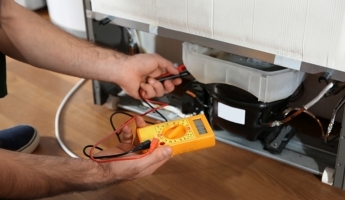The importance of servicing your commercial refrigeration
Listed Under: Blog
The value of a working commercial fridge is often underappreciated, until it breaks down. And suddenly, you realise how much we depend on it. Imagine the chaos of a fridge breaking down in the middle of a busy lunchtime rush. You have a moment to decide what to do, but ultimately, without a backup, your stock spoils, you suffer from downtime and your reputation takes a hit. Not good.
Regular servicing protects this backbone of your business, enhancing your return on investment in commercial refrigeration and preventing costly breakdowns. Most importantly, it ensures you and your business stay compliant with food and drink regulations.
This article explores why servicing matters, how to spot trouble early, and how to keep your kitchen running smoothly amid the chaos.
How regular servicing prevents costly breakdowns and safety risks
Ignoring fridge maintenance may seem tempting when time and money feel tight. However, small problems can grow rapidly inside refrigeration units. Dust builds up, seals wear out and components weaken. Without professional checks, you risk sudden breakdowns that stop your kitchen in its tracks.
The bigger hit from a fridge failure comes from wasted stock, lost sales and the scramble to rectify the situation quickly. It can all get somewhat hectic, and you’ll need to pay extra for those emergency repairs. It’s also challenging to transfer all that stock into an alternative unit (if one is available) before the temperature rises too high. If you don’t spot it soon enough and it gets into the danger zone, you’ll need to throw it all out.
Experts recommend servicing your commercial refrigeration at least twice a year. Preventive maintenance includes cleaning the coils, checking the door seals, testing temperatures and inspecting the electrical parts. This brings your business much-needed peace of mind and reduces running costs. It’s a win/win.
Meet legal requirements by spotting early warning signs
Listen for unusual noises, such as grinding compressors or rattling fans. Notice if the fridge struggles to maintain temperature or if frost builds up inside. Sticky or broken door seals let cold air escape, forcing the refrigerator to work harder.
Then there’s temperature compliance. Your business must maintain daily temperature records to comply with food safety regulations, including HACCP, as well as the FSA’s guidelines, which are still largely based on the European Regulations (EC) from 2004, such as Regulation No. 852/2004. Some units come with automatic temperature monitoring systems that alert you to deviations early. You can even get some systems that track temperature over time. These inevitably prove invaluable during inspections and audits.
The Food Standards Agency requires food businesses to maintain refrigeration equipment in good working order to ensure food safety. Regular servicing supports this requirement by preventing breakdowns and maintaining safe temperatures. And that’s where servicing from a professional really takes the stress out of things, because you have proof that you’ve done your due diligence to keep your unit safe and operational. A fridge that fails to meet these standards risks closure or fines. Insurance policies may also require proof of servicing to honour claims.
It pays to use engineers who specialise in commercial refrigeration. Look for technicians with F-Gas certification and those who have solid experience. They’ll diagnose issues properly, use the right parts, and follow the correct safety procedures. Some warranties require proof of servicing from qualified professionals, so it’s worth checking the fine print and choosing someone who meets the mark.
Making servicing work for your business
Running a small food business means juggling budgets and timing. Service contracts alleviate pressure by planning regular visits around your schedule. Contacts give you predictable costs and one less thing to worry about. If you’re not ready for a contract, call-out options work, too, as long as you’ve got someone reliable when things go wrong.
In the meantime, a simple maintenance tick list and record booklet goes a long way. Keep an eye on things like condenser coils, door seals, defrost systems, temperature accuracy and electrical connections, and keep a record of tasks completed (and temperatures at specific points during the day). These are valuable for your own records, as well as FSA enquiries and warranty claims.
Because when something breaks down unexpectedly, the repair bill often shoots up. Emergency fixes typically cost significantly more than regular servicing, sometimes double, depending on the timing and the nature of the fault. On top of that, unexpected breakdowns hit your stock, slow your service and put pressure on the team. Regular maintenance spreads the cost and cuts the stress. It’s so important.
And as if you needed any more reason to invest in regular servicing, well-maintained fridges also last longer. Maintaining your equipment helps keep it running smoothly and delays the need for expensive replacements. That means less disruption, fewer surprises and a better return on your original investment.
So if you’re ready for the peace of mind that cost-effective regular fridge servicing brings, get in touch with us at Fridgesmart. We understand the demands small food businesses like yours face, and we’d be delighted to help you navigate those problems. Get in touch today to learn more.

 loading...
loading...